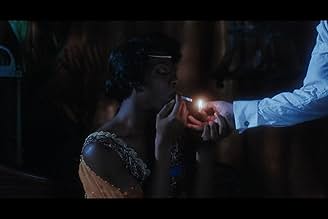Agrega una trama en tu idiomaWhen a bishop comes to a prison to hear the confession of an old friend he is forced to watch a play, performed by the inmates, about their youth together, love and betrayal.When a bishop comes to a prison to hear the confession of an old friend he is forced to watch a play, performed by the inmates, about their youth together, love and betrayal.When a bishop comes to a prison to hear the confession of an old friend he is forced to watch a play, performed by the inmates, about their youth together, love and betrayal.
- Dirección
- Guionistas
- Elenco
- Premios
- 8 premios ganados y 14 nominaciones en total
Benoît Lagrandeur
- Prison Ensemble
- (as Benoit Lagrandeur)
Pierre Leblanc
- Prison Ensemble
- (as Pierre LeBlanc)
Jean Lévesque
- Prison Ensemble
- (as Jean Levesque)
Opiniones destacadas
10bob-504
Luscious cinematography, soulful musical score, terrific casting, and limited use of revelatory flashbacks to dramatize the theme of societally-defined mores and criminal behavior. Artistic and judicious use of nudity and sexuality to illustrate the dilemmas of public versus private morality.
This film is proof that some of the most iridescent, incredible films never make it to mainstream America. Barely anyone I know has even heard of this movie, and it's quite saddening. Although it has won numerous awards and lots of prestige in Canada, where it was made, I've often seen it lying on the shelf untouched at Blockbuster or gay film shops.
The movie begins with a prisoner named Simone who requests that a specific priest come to hear his confession. The priest, perplexed as to why he has been summoned, arrives at the prison, not knowing what to expect. It is soon divulged that the priest has some confessing of his own to be done when the prisoners trap him in his confessional box and begin to perform a play. This play is about Simone's childhood, when Simone was attending a Catholic all-boys boarding school and was in a gay relationship with his schoolmate, Valier. They keep their love clandestine until another schoolmate, Bilodeau (the priest as an adolescent), unearths something of what the two lovers have been doing. He confronts them about it, calling them a "disease," when it is revealed later that he is more insidious than they are.
Things take another dramatic turn when Simone's father discovers his son has kissed a boy and mutilates his body with a whip. Out of searing rage, Simone succombs to arson. A Parisian woman (who is portrayed by a male actor because the play is being performed by male prisoners) visits the schoool and falls in love with Simone. Despite the distinctely male features on her which expose the actor's gender, the he does an excellent job of emulating a pristine, romantic woman desperately seeking love.
Simone repudiates Valier, saying "it's time he started thinking about girls" and that he plans to marry the Parisian woman. Valier is devastated and runs to his mother, who is scorned by the rest of society because she believes herself to be a countess. She is shockingly compassionate and supportive when she learns of Valier's homosexuality. At the engagement banquet for Simone and his fiancee, Valier sabotages the celebration by dressing like a Greek God and reciting a monologue from the romantic Greek play he and his beloved were rehearsing together in the beginning of the film. And I can't tell you the rest. It'll ruin it. All I know is everyone should see this movie-especially gay Catholics. Incredible directing, eloquent dialogue, wonderfully abstract scenary-there's no way this movie could have been done better!
The movie begins with a prisoner named Simone who requests that a specific priest come to hear his confession. The priest, perplexed as to why he has been summoned, arrives at the prison, not knowing what to expect. It is soon divulged that the priest has some confessing of his own to be done when the prisoners trap him in his confessional box and begin to perform a play. This play is about Simone's childhood, when Simone was attending a Catholic all-boys boarding school and was in a gay relationship with his schoolmate, Valier. They keep their love clandestine until another schoolmate, Bilodeau (the priest as an adolescent), unearths something of what the two lovers have been doing. He confronts them about it, calling them a "disease," when it is revealed later that he is more insidious than they are.
Things take another dramatic turn when Simone's father discovers his son has kissed a boy and mutilates his body with a whip. Out of searing rage, Simone succombs to arson. A Parisian woman (who is portrayed by a male actor because the play is being performed by male prisoners) visits the schoool and falls in love with Simone. Despite the distinctely male features on her which expose the actor's gender, the he does an excellent job of emulating a pristine, romantic woman desperately seeking love.
Simone repudiates Valier, saying "it's time he started thinking about girls" and that he plans to marry the Parisian woman. Valier is devastated and runs to his mother, who is scorned by the rest of society because she believes herself to be a countess. She is shockingly compassionate and supportive when she learns of Valier's homosexuality. At the engagement banquet for Simone and his fiancee, Valier sabotages the celebration by dressing like a Greek God and reciting a monologue from the romantic Greek play he and his beloved were rehearsing together in the beginning of the film. And I can't tell you the rest. It'll ruin it. All I know is everyone should see this movie-especially gay Catholics. Incredible directing, eloquent dialogue, wonderfully abstract scenary-there's no way this movie could have been done better!
This film stands out in my collection as the most beautiful gay love story on film so far. It's lyrical story-telling is accented by it's Romeo & Juliet-inspired forbidden love theme, while avoiding any political message that plagues today's current stream of gay love stories. With it's gorgeous location, haunting sound-track and surreal moments of simple tenderness, Lilies succeeds at simply being a beautiful film.
I have seen Lilies on more than one occasion, and am amazed each time at the intricate and ingenious use of the "theatrical" in the movie. When watching the movie from the beginning, it doesn't take a moron to realize that the "play" is being put on by inmates at a prison.
Staying true to the "setting" of the play, the movie uses males to play all roles, including the roles of women. It is unique as the characters in the "play" react and respond to the female roles as if they were women and not men playing women's roles.
There is an incredible depth to the movie that chronicles the life and love lost by Simone through the deception and lies of the "church." There is much more meaning here than just the plight of one man. The movie tell the story of many men and women around the world who are persecuted, imprisoned, and often sacrifice their lives for being true to their love of the same sex. It is good to see a movie that does not portray a same sex relationship as one of casual sex or one-night stands. The relationship is one of committment, of trust, of pain and caring, of going through the good and the bad together. Heterosexuals do not have the corner on good relationships. This movie tries to portray the love between two people and the struggles they faced, largely due to the intolerance and rigidity of the church.
Staying true to the "setting" of the play, the movie uses males to play all roles, including the roles of women. It is unique as the characters in the "play" react and respond to the female roles as if they were women and not men playing women's roles.
There is an incredible depth to the movie that chronicles the life and love lost by Simone through the deception and lies of the "church." There is much more meaning here than just the plight of one man. The movie tell the story of many men and women around the world who are persecuted, imprisoned, and often sacrifice their lives for being true to their love of the same sex. It is good to see a movie that does not portray a same sex relationship as one of casual sex or one-night stands. The relationship is one of committment, of trust, of pain and caring, of going through the good and the bad together. Heterosexuals do not have the corner on good relationships. This movie tries to portray the love between two people and the struggles they faced, largely due to the intolerance and rigidity of the church.
This is a film of rare and astonishing brilliance, and unlike anything I personally have ever encountered before. It is exquisitely photographed and edited, and the acting is first rate all round. The all-male cast portraying both men and women might be off-putting for some, but it is performed so expertly that one forgets this detail - it is a film that magnificently transcends gender. In particular is Brent Carver's resplendent turn as the `mad countess,' the gentle, guileless mother of one of the young heroes. The story is a heartbreaking tale of love, jealousy, and ultimately, of Judgement Day, of the Day of Reckoning. That its storyline is about gay love should not put off heterosexual film goers, because the theme is timeless and universal. A bold and brilliant must see.'
¿Sabías que…?
- Citas
Young Simon: [to Vallier] I shall be reborn. My breath in the heavens, bear witness. We shall be free. We'll we be loved. If you do truly love me, let your love be known unto me.
Selecciones populares
Inicia sesión para calificar y agrega a la lista de videos para obtener recomendaciones personalizadas
- How long is Lilies?Con tecnología de Alexa
Detalles
Taquilla
- Presupuesto
- CAD 2,200,000 (estimado)
- Total en EE. UU. y Canadá
- USD 301,548
- Fin de semana de estreno en EE. UU. y Canadá
- USD 28,781
- 12 oct 1997
- Total a nivel mundial
- USD 301,548
Contribuir a esta página
Sugiere una edición o agrega el contenido que falta

Principales brechas de datos
By what name was Lilies - Les feluettes (1996) officially released in India in English?
Responda































